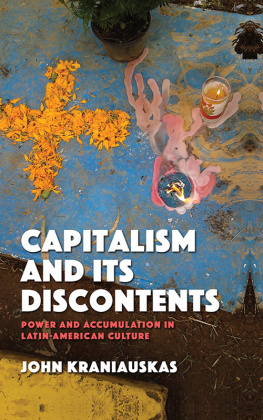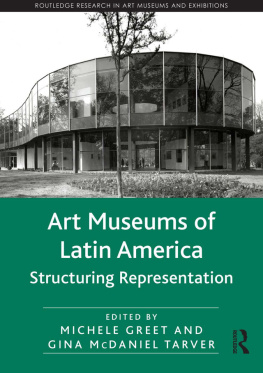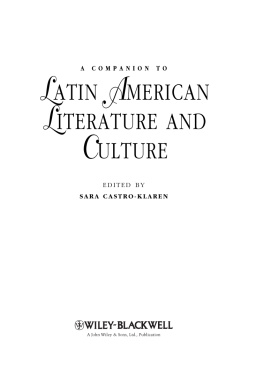To begin with, I would like to thank Roger Bartra and Josefina Alczar for suggesting the idea for this book, originally published in Mexico in 2012 with the title Polticas literarias: poder y acumulacin en la literature y el cine latinoamericanos. Over the years I have benefitted greatly from the intellectual support and friendship of many colleagues in the UK, Europe and the Americas. I would especially like to thank Gerry Martin, Alberto Moreiras, Gareth Williams, Julio Ramos, Josefina Ludmer, Danny James, Margo Glanz, Brett Levisnon, Patrick Dove, William Rowe, Catherine Boyle, Jon Beasley-Murray, Jean Franco, Bruno Bosteels, Nelly Richard, Jens Andermann, Dan Balderston, Mpalive Msiska, John Beverley, Mabel Moraa, Guillermo Zermeo, Carmen Fracchia, Gabriela Nouzeilles, Tim Girven, Luis Trindade, Herman Herlinghaus, Loraine Leu, Zoltan Biedermann, Horacio Legrs, Adriana Johnson, Sergio Villalobos, Willy Thayer and the late Carlos Monsivis and David Vias.
Four people have accompanied me closely in the thinking through and writing of this book, and I would like to thank them especially: Carol Watts, Philip Derbyshire, Harry Kraniauskas and Peter Osborne.
Versions of the chapters of this book were first published in the following publications:
Beware Mexican Ruins!, One-Way Street and the Colonial Unconscious, in Andrew Benjamin and Peter Osborne (eds), Walter Benjamins Philosophy: Destruction and Experience, Warwick Studies in European Philosophy (London: Routledge, 1994).
Maritegui, Benjamin, Chaplin, in Mabel Moraa and Hermann Herlinghaus (eds), Fronteras de la modernidad en Amrica Latina (Pittsburgh: University of Pittsburgh Press, 2003).
A Short Andean History of Photography: Yawar fiesta, Journal of Latin American Cultural Studies, 21, 3 (2012).
Para una lectura poltica de El Seor Presidente: notas sobre el maldoblestar cultural, in Miguel Angel Asturias, El Seor Presidente, ed. Gerald Martin (Nanterre: Archivos, 2001).
De la ideologa a la cultura: subalternizacin y montaje. Yo el Supremo como libro de historia, Historia y Grafa, 12 (1999).
Retorno, melancola y crisis de futuro: El fiscal de Augusto Roa Bastos, in Josefina Ludmer (ed.), Las culturas de fin de siglo en Amrica Latina (Rosario: Beatriz Viterbo Editora, 1994).
Critical Closeness: the Chronicle-Essays of Carlos Monsivis, in Carlos Monsivis, Mexican Postcards, ed. and trans. John Kraniauskas (London and New York: Verso, 1997).
Revolucin-Porno: El fiord y el estado Eva-Peronista, Boletn, 8 (2000).
Noir into History: James Ellroys Bloods A Rover, Radical Philosophy, 163, SeptemberOctober (2010).
Cronos and the political economy of vampirism: notes on a historical constellation, in Francis Barker, Peter Hulme and Margaret Iverson (eds), Cannibalism and the Colonial Order (Cambridge: Cambridge University Press, 1998).
Amores perros y la mercantilizacin del arte (bienes, tumba, trabajo), Revista de Crtica Cultural, 33 (2006).
Elasticity of Demand: Reflections on The Wire, Radical Philosophy, 154, MarchApril (2009).
Gobernar es repoblar: sobre la acumulacin originaria neo-liberal, in Revista Iberoamericana, LXIX, 203, Abril-Junio, 2003.
Adorno, Theodor W., Prologue to Television, Critical Models: Interventions and Catchwords, trans. Henry W. Pickford (New York: Columbia University Press, 1998), pp. 4957.
Adorno, Theodor W., Hegel: Three Studies, trans. Shierry Weber Nicholsen (Cambridge and London: MIT Press, 1993).
Adorno, Theodor W., Transparencies on Film, in J. M. Bernstein (ed.), The Culture Industry: Selected Essays on Mass Culture (London: Routledge, 1992), pp. 15461.
Adorno, Theodor W., The Essay as Form, Notes to Literature, trans. Sherry Weber Nicholsen (New York: Columbia University Press, 1991), vol. 1, pp. 323.
Adorno, Theodor W., Negative Dialectics, trans. E. B. Ashton (London: Routledge, 1990).
Adorno, Theodor W., Letters to Walter Benjamin, in Ernst Bloch, et al., Aesthetics and Politics (London: Verso, 1980), pp. 11033.
Adorno, Theodor W., Aesthetic Theory (London: Continuum, 2004).
Adorno, Theodor W. and Horkheimer, Max, Dialectic of the Enlightenment, trans. J. Cummings (London: Verso, 1979). Allen, Michael, Divided Interests: Split-Screen Aesthetics in 24, in Steven Peacock (ed.), Reading 24: TV against the Clock (London and New York: I. B. Tauris, 2007), pp. 3549.
Althusser, Louis, Marx in his Limits, Philosophy of the Encounter: Late Writings, 19781987, trans. G. M. Goshgarian (London and New York: Verso Books, 2006), pp. 95126.
Althusser, Louis, Machiavelli and Us, trans. Gregory Elliot (London: Verso, 1999).
Althusser, Louis, Ideology and Ideological State Apparatuses (Notes towards an Investigation), Essays on Ideology (London: Verso, 1993), pp. 160.
Anderson, Benedict, Imagined Communities: Reflections on the Origin and Spread of Nationalism (London: Verso, 1991).
Anderson, Perry, The Origins of Postmodernity (London and New York: Verso Books, 1998).
Ansin, Juan (ed.), Pishtacos: de verdugos a sacaojos (Lima: Tarea, 1989).
Anzieu, Didier, The Skin Ego: A Psychoanalytic Approach to the Self (New Haven: Yale University Press, 1989).
Appadurai, Arjun, Fear of Small Numbers: An Essay on the Geography of Anger (Durham: Duke University Press, 2006).
Aristotle, The Nicomachean Ethics (Oxford: Oxford University Press, 1980).
Arguedas, Jos Mara, Yawar fiesta (Lima: Editorial Horizonte, 2010).
Arguedas, Jos Mara, The Novel and the Problem of Literary Expression in Peru, Yawar fiesta, trans. Frances H. Barraclough (Prospect Heights: Waveland Press, 1985), pp. 14992.
Arguedas, Jos Mara, El zorro de arriba y el zorro de abajo (Buenos Aires: Losada, 1975).
Arriaga, Guillermo, Amores perros (London: Faber, 2001).
Arrighi, Giovanni, Adam Smith in Beijing: Lineages of the Twenty-First Century (London and New York: Verso, 2007).
Arrighi, Giovanni, The Long Twentieth Century: Money, Power and the Origins of Our Times (London and New York: Verso, 1994).
Asturias, Miguel ngel, El Seor Presidente, critical edn Gerald Martin (Nanterre: Unesco/Archivos, 2000).
Aug, Marc, Les mtamorphoses du vampire dun societ de consommation a lautre, Destins du cannibalisme, Nouvelle Revue de Psychanalyse, 6 (1972), 12948.
Avellaneda, Andrs, El habla de la ideologa (Buenos Aires: Sudamericana, 1983).
Badiou, Alain, Theory of the Subject, trans. Bruno Bosteels (London: Continuum, 2009).
Badiou, Alain, Manifesto for Philosophy, trans. Norman Madarasz (Albany, NY: SUNY Press, 1999).
Balibar, Etienne, The Philosophy of Marx, trans. Greg Elliot (London: Verso, 1995).
Balibar, Etienne, The Nation Form: History and Ideology, in Etienne Balibar and Immanuel Wallerstein, Race, Nation, Class: Ambiguous Identities (London: Verso, 1991), pp. 86106.
Barrett, Rafael, El dolor paraguayo (Caracas: Biblioteca Ayacucho, 1978).
Bartra, Roger, Agrarian Structure and Political Power, trans. Stephen K. Ault (Baltimore: The Johns Hopkins University Press, 1993).
Bartra, Roger, La jaula de la melancola: identidad y metamorfosis del mexicano (Mexico: Grijalbo, 1987).
Barthes, Roland, From Work to Text, Image-Music-Text, ed. and trans. Stephen Heath (Glasgow: Fontana/Collins, 1977), pp. 15564.
Barthes, Roland, The Poor and the Proletariat, Mythologies (St Albans: Paladin, 1976), pp. 3942.
Bataille, Georges,
Next page






